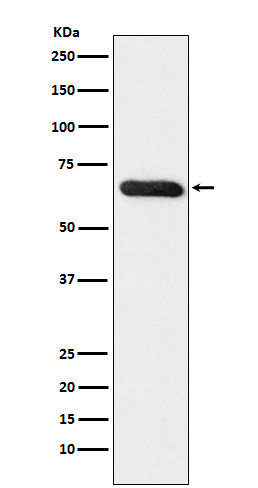
| WB | 咨询技术 | Human,Mouse,Rat |
| IF | 咨询技术 | Human,Mouse,Rat |
| IHC | 咨询技术 | Human,Mouse,Rat |
| ICC | 1/50-1/200 | Human,Mouse,Rat |
| FCM | 咨询技术 | Human,Mouse,Rat |
| Elisa | 咨询技术 | Human,Mouse,Rat |
| Aliases | SUH; csl; AOS3; CBF1; KBF2; RBP-J; RBPJK; IGKJRB; RBPSUH; IGKJRB1;;RBPJ |
| WB Predicted band size | Calculated MW: 56 kDa ; Observed MW: 60 kDa |
| Host/Isotype | Rabbit IgG |
| Antibody Type | Primary antibody |
| Storage | Store at 4°C short term. Aliquot and store at -20°C long term. Avoid freeze/thaw cycles. |
| Species Reactivity | Human,Mouse,Rat |
| Immunogen | A synthesized peptide derived from human RBPJ |
| Formulation | Purified antibody in PBS with 0.05% sodium azide,0.05% BSA and 50% glycerol. |
+ +
以下是3篇与RBP-Jκ(RBPJK)抗体相关的参考文献摘要概括:
---
1. **文献名称**: "RBP-Jκ (CBF1) is essential for endothelial cell proliferation and angiogenesis"
**作者**: Krebs LT et al.
**摘要**: 本研究利用RBP-Jκ特异性抗体,通过免疫组化(IHC)和染色质免疫沉淀(ChIP)技术,验证了RBP-Jκ在血管内皮细胞增殖和血管生成中的关键作用,揭示了Notch信号通路在发育中的调控机制。
2. **文献名称**: "Canonical Notch signaling is required for the specification of hematopoietic stem cells"
**作者**: Kumano K et al.
**摘要**: 文章通过Western blot(WB)和流式细胞术,使用RBP-Jκ抗体证明Notch/RBP-Jκ通路在造血干细胞分化中的必要性,并发现其缺失导致造血前体细胞发育异常。
3. **文献名称**: "RBP-Jκ-dependent Notch signaling enhances retinal ganglion cell survival after optic nerve injury"
**作者**: Li T et al.
**摘要**: 该研究通过免疫荧光(IF)和基因敲除模型,结合RBP-Jκ抗体检测,表明Notch-RBP-Jκ通路在视神经损伤后通过抑制神经元凋亡促进视网膜神经节细胞存活。
---
以上文献均聚焦RBP-Jκ抗体在Notch信号通路研究中的实验应用(如WB、ChIP、IF等),涵盖发育生物学、干细胞及神经再生领域。如需具体DOI或补充文献,可进一步说明。
The Recombination Signal Binding Protein for Immunoglobulin Kappa J Region (RBPJκ), also known as CBF1 or CSL, is a conserved transcription factor critical for mediating Notch signaling, an evolutionarily conserved pathway regulating cell differentiation, proliferation, and survival. RBPJκ acts as a central DNA-binding component, interacting with Notch receptors’ intracellular domains (NICD) upon ligand activation. This interaction displaces co-repressors and recruits co-activators (e.g., Mastermind-like proteins) to modulate target gene expression, including *Hes* and *Hey* families.
RBPJκ antibodies are essential tools for studying Notch pathway dynamics. They enable detection of RBPJκ expression, localization (nuclear vs. cytoplasmic), and protein-protein/DNA interactions via techniques like Western blot, immunofluorescence, chromatin immunoprecipitation (ChIP), and electrophoretic mobility shift assays (EMSA). These antibodies help investigate RBPJκ’s roles in development, stem cell maintenance, and diseases such as cancer (e.g., T-cell leukemia, breast cancer), cardiovascular disorders, and neurological conditions.
Validated RBPJκ antibodies (monoclonal/polyclonal) are crucial for specificity, often confirmed using RBPJκ-knockout controls. Commercial antibodies vary in host species (rabbit, mouse), epitope targets (N-terminal, C-terminal), and applications (e.g., IP-specific clones). Researchers prioritize antibodies with published data in their experimental models to ensure reliability. Dysregulated RBPJκ/Notch signaling is a therapeutic target, underscoring the antibody’s relevance in mechanistic and translational studies.
×